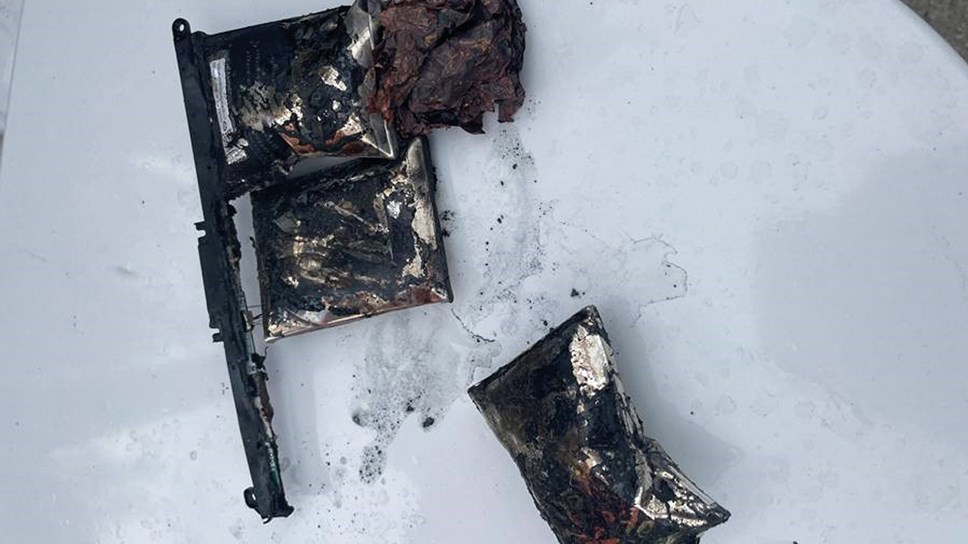
Incorrect battery disposal sparks Council to warn of fire risk
Following an incident at West Oxfordshire District Council's Witney depot last month, the Council is warning residents of the risk of incorrectly disposing of lithium-ion batteries as increasing numbers of fires starting in refuse and recycling vehicles and at waste sorting facilities are reported nationally.
According to research by Materials Focus, the organisation behind the national Recycle Your Electricals campaign, more than 700 waste-related fires are responded to each year by the emergency services due to the unsafe disposal of batteries, many of which are hidden inside electrical equipment. But with many incidents being dealt with quickly and without the need of external assistance, the real figure could be significantly higher.
Councillor Lidia Arciszewska, Executive Member for Environment at West Oxfordshire District Council, said: “Following a recent incident at the Downs Road depot we’re reminding householders of the importance of disposing of their batteries safely. On this occasion a fire was averted by the quick actions of one of Ubico’s employees who noticed smoke coming from the bay where the recycling is tipped. Further investigation found the object, which had ignited, to be a damaged battery which in all likelihood had been crushed in the back of the recycling vehicle. With so much flammable paper and cardboard in the bay the situation could have escalated very quickly with devastating consequences.”
The use of lithium-ion batteries is becoming more and more commonplace and can be found in a rage of electrical and electronic items, including rechargeable items like mobiles, cameras, toothbrushes, laptops and e-cigarettes, the popularity of which has skyrocketed in recent years.
Part of the problem is that batteries can often be hidden inside an appliance making them hard to notice or separate out.
Councillor Arciszewska continued: “Should lithium batteries end up in the refuse or in the body of the recycling truck there’s a very real risk of the battery being punctured by the compacting equipment with the potential to ignite or explode in the back of the lorry, causing damage, disrupting waste collections and ultimately putting lives at risk. The good news is that batteries and small appliances can still be recycled at the kerb just as long as they’re separated out from the main recycling. Alternatively, they can be taken to the Household Waste Recycling Centre or any retailer that sells batteries and electricals and who has a duty to offer a take back service for these types of goods.”
Residents can recycle their small electrical and electronic items using the Council’s kerbside service by placing them in their black box. Due to their small size, vapes should be placed inside an envelope or ideally an old plastic bag and left on the lid on top of the blue-lidded recycling bin ready for collection. Household batteries should be recycled in the same manner.
Electricals and batteries are stored separately on the recycling vehicle so are not compacted, massively reducing the risk of fire.
Electricals, electronics and batteries can also be taken to the local Household Waste Recycling Centre at Dix Pit, Stanton Harcourt for recycling in the dedicated bins.
Stores that sell over 32kg of batteries a year (the equivalent of one pack of 4 AA batteries per day) legally have to provide a collection point for recycling on their premises. By law, any shop selling electrical and electronic items must offer a like-for-like take-back service so these can be disposed of safely.
The Council is keen to point out that lithium-ion batteries are safe if used normally but care should be taken not to over-charge them, damage them or submerge them in water.
Details of the District Council’s kerbside recycling services can be found at: https://www.westoxon.gov.uk/bins-and-recycling/
Contact Information
West Oxfordshire District Council Communications Team
Notes to editors
- An independent report by Eunomia in 2021 concluded that nearly 50% of all recycling and waste fires in the UK are started by lithium-ion batteries alone and that the total cost of these fires to the country exceeds £150m each year.
- Batteries can also contain toxic heavy metals such as nickel and cadmium which can leak and cause pollution if they are not recycled properly and also contain valuable, finite metals which should be recycled to limit the environmental damage from extracting new metals and ensuring the availability of future resources, particularly used in tech appliances.
- According to Materials Focus, the UK buys half a billion vapes a year and throws away 1.3 million single-use vapes every week.
